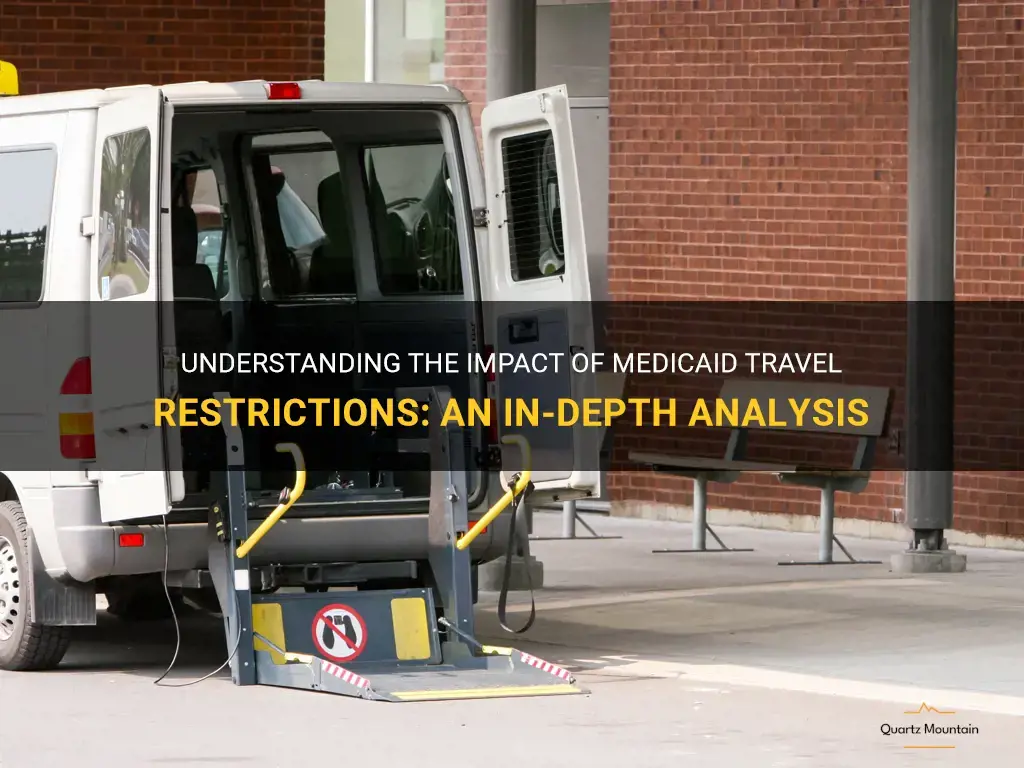
Medicaid travel restrictions have long been a contentious topic in the healthcare industry, with proponents arguing that they are necessary to prevent misuse of taxpayer dollars, while critics argue that they disproportionately affect low-income individuals who rely on Medicaid for their healthcare needs. These restrictions can vary by state, with some states implementing strict guidelines that limit the ability of Medicaid recipients to travel outside of their home state, while others have more lenient policies. This creates a complex web of regulations that can have a significant impact on the lives of those relying on Medicaid for their healthcare coverage. Understanding the implications of these travel restrictions is crucial in order to advocate for equitable access to healthcare for all individuals, regardless of their income or geographical location.
What You'll Learn
- What types of travel restrictions are placed on Medicaid beneficiaries?
- Are there any exceptions to Medicaid travel restrictions?
- How do Medicaid travel restrictions impact low-income individuals who rely on the program for healthcare coverage?
- What is the rationale behind implementing travel restrictions for Medicaid beneficiaries?
- Are Medicaid travel restrictions consistent across all states, or do they vary?

What types of travel restrictions are placed on Medicaid beneficiaries?

Medicaid is a government-funded healthcare program in the United States that provides medical assistance to low-income individuals and families. While the program offers valuable benefits, including coverage for healthcare services and medications, there are certain travel restrictions placed on Medicaid beneficiaries.
- Limited Out-of-State Coverage: Medicaid coverage is typically limited to the state where the beneficiary resides. If a beneficiary wishes to travel out of state, their coverage may be limited or not available at all. However, there are exceptions to this rule, such as emergency medical care or certain types of specialized treatments that are not available in the beneficiary's home state.
- Prior Authorization: In some cases, Medicaid beneficiaries may need to obtain prior authorization before traveling out of state to receive non-emergency medical care. This means that they must get approval from their Medicaid managed care organization or the state Medicaid agency to ensure that the care they seek is medically necessary and cost-effective.
- Neighboring State Coverage: Some states have reciprocal agreements with their neighboring states, allowing Medicaid beneficiaries to receive healthcare services across state lines. This is especially common in border areas where individuals may have easier access to medical facilities in another state.
- Temporary Absence: Medicaid beneficiaries are generally allowed temporary absence from their home state without losing their coverage. This is useful for individuals who travel for short periods, such as vacations, family visits, or business trips. However, the duration and eligibility requirements for temporary absence can vary depending on state policies, so beneficiaries should check with their state Medicaid agency for specific guidelines.
- Home and Community-Based Services Waivers: Medicaid provides home and community-based services (HCBS) waivers that allow beneficiaries to receive long-term care services in their homes or community settings instead of institutional care. These waivers often have specific requirements and restrictions regarding travel, as beneficiaries must remain within a certain geographic area to qualify for HCBS services.
It is important for Medicaid beneficiaries to understand the travel restrictions that may apply to them before planning any trips or seeking medical care outside of their home state. Each state has its own Medicaid program, so the rules and policies can vary. Beneficiaries should contact their state Medicaid agency, Medicaid managed care organization, or healthcare provider for more information on travel restrictions and how to obtain necessary care while traveling.
New Travel Restrictions Enforced by Gina Raimondo Aim to Combat COVID-19 Spread
You may want to see also

Are there any exceptions to Medicaid travel restrictions?

Medicaid is a government program that provides health coverage to eligible low-income individuals and families. While the program offers many benefits, including medical care, prescriptions, and transportation assistance, there are restrictions related to travel.
Typically, Medicaid does not cover non-emergency medical services that are obtained outside of the applicant's home state. This means that if someone on Medicaid needs medical treatment while traveling, the program may not cover the costs unless it is deemed an emergency.
However, there are exceptions to these travel restrictions. Medicaid may cover out-of-state medical care in certain situations, such as:
- Reciprocity Agreements: Some states have reciprocal agreements with neighboring states to provide medical care to Medicaid recipients. Under these agreements, eligible individuals can receive treatment in the neighboring state and have it covered by their home state's Medicaid program.
- Medical Necessity: If a Medicaid recipient requires specialized medical treatment that is not available in their home state, they may be able to travel out-of-state to receive it. However, it is important to obtain prior authorization from Medicaid to ensure that the treatment will be covered.
- Emergency Medical Care: Medicaid always covers emergency medical care, regardless of where it occurs. If a Medicaid recipient experiences a medical emergency while traveling, they should seek immediate medical attention, and the costs should be covered by the program.
It is crucial to note that these exceptions to Medicaid travel restrictions vary by state, as Medicaid is administered at the state level. Therefore, it is essential to check with the individual state's Medicaid agency for specific rules and guidelines.
Additionally, Medicaid often provides non-emergency medical transportation services to eligible individuals who need help getting to and from medical appointments. This service can be particularly beneficial for those who require regular medical treatment and may need to travel within their home state.
In conclusion, while Medicaid typically has travel restrictions for non-emergency medical services obtained outside of the applicant's home state, there are exceptions. Reciprocal agreements, medical necessity, and emergency care are some of the circumstances in which Medicaid may cover out-of-state medical care. It is essential to consult with the state's Medicaid agency for specific guidelines and rules regarding travel and coverage.
Understanding Interstate Travel Restrictions in Malaysia
You may want to see also

How do Medicaid travel restrictions impact low-income individuals who rely on the program for healthcare coverage?
Many low-income individuals rely on Medicaid for their healthcare coverage. Medicaid is a federal program that provides healthcare assistance to people with low income, including pregnant women, children, elderly adults, and individuals with disabilities. While Medicaid is designed to provide essential healthcare services to those who need it most, there are often travel restrictions in place that can have a significant impact on individuals who rely on the program for their healthcare needs.
One of the primary ways that travel restrictions impact low-income individuals who rely on Medicaid is by limiting their access to healthcare services. Medicaid programs are administered at the state level, and each state has the authority to determine who is eligible for the program and what services are covered. Some states impose travel restrictions on Medicaid recipients, requiring them to seek care only within their state of residence. This can be especially problematic for individuals who live close to state borders and may have easier access to healthcare services in a neighboring state.
These travel restrictions can create significant barriers to healthcare for low-income individuals. For example, if a Medicaid recipient needs to see a specialist or receive a specific medical treatment that is not available in their state of residence, they may have to travel a significant distance to access the care they need. This can be particularly burdensome for individuals who do not have reliable transportation or the financial resources to cover the costs associated with travel.
Additionally, Medicaid travel restrictions can result in delayed or denied healthcare services for low-income individuals. If a Medicaid recipient cannot access the necessary healthcare services within their state of residence and is unable to travel to another state, they may be forced to go without the care they need. This can have serious consequences for their health and well-being, potentially leading to worsening health conditions, reduced quality of life, and increased healthcare costs in the long run.
Furthermore, travel restrictions can also impact low-income individuals who rely on Medicaid for prescription medications. Some states require Medicaid recipients to obtain their medications from in-state pharmacies, limiting their ability to fill prescriptions at out-of-state pharmacies. This can be challenging for individuals who regularly travel or who live in areas where there are limited pharmacy options.
In conclusion, Medicaid travel restrictions can have a significant impact on low-income individuals who rely on the program for healthcare coverage. These restrictions can limit access to healthcare services, result in delayed or denied care, and create challenges for individuals seeking prescription medications. It is important for policymakers to consider the potential consequences of travel restrictions and work towards solutions that ensure equitable access to healthcare for all Medicaid recipients, regardless of their location.
Latest Update on Lonavala Travel Restrictions: What You Need to Know
You may want to see also

What is the rationale behind implementing travel restrictions for Medicaid beneficiaries?

Travel restrictions for Medicaid beneficiaries are policies that limit or restrict the ability of individuals covered by Medicaid to travel outside of their state or region without losing their benefits. These restrictions are often put in place by states as a means of controlling costs and ensuring that Medicaid funds are being used appropriately. While travel restrictions can be controversial and have been met with criticism, there are several reasons behind their implementation.
One rationale behind travel restrictions for Medicaid beneficiaries is to prevent fraud and misuse of benefits. By limiting travel outside of the designated region, states can minimize the risk of individuals using their Medicaid benefits to receive services or medications in another state that may be more expensive or unnecessary. This is particularly relevant for non-emergency medical transportation (NEMT) services, where individuals may be tempted to travel long distances to access certain providers or facilities. Travel restrictions can help to ensure that Medicaid funds are being used exclusively for essential, local healthcare services, thus reducing the potential for fraudulent activities.
Another rationale is to encourage the use of local healthcare resources and promote continuity of care. Limiting travel can help to ensure that individuals receive care from providers within their area, thus fostering relationships and continuity of care with local healthcare professionals. This approach is believed to enhance the quality and coordination of care, as providers are more likely to have access to patients' medical records and can communicate more effectively with other members of the care team. Moreover, promoting the use of local resources can also benefit healthcare providers and facilities within the region, as it helps to distribute Medicaid funding more evenly and support local economies.
Additionally, travel restrictions can be seen as a way to manage costs and prioritize limited Medicaid resources. Medicaid is a means-tested program that provides healthcare coverage to low-income individuals and families, and the demand for Medicaid services often exceeds available funding. By limiting travel, states can allocate resources more effectively and ensure that individuals within their state or region have access to the healthcare services they need. This approach is particularly relevant in states with larger populations or higher rates of Medicaid enrollment, where the cost of providing care to beneficiaries who travel extensively can strain budgets and potentially limit access for those who reside locally.
Despite these rationales, travel restrictions for Medicaid beneficiaries have faced criticism from various quarters. Critics argue that such restrictions can create barriers to care for individuals who need to travel for specialized or timely treatments not available in their local area. Additionally, some argue that travel restrictions may disproportionately affect low-income individuals who may not have access to reliable transportation, making it difficult for them to access necessary healthcare services. These concerns highlight the need for states to carefully consider the potential impacts of travel restrictions and ensure that they do not unduly limit access to care or impede medical progress.
In conclusion, travel restrictions for Medicaid beneficiaries are implemented to prevent fraud, promote continuity of care, and manage costs. While these restrictions aim to protect the integrity of the Medicaid program and ensure appropriate use of resources, they must be carefully balanced with the need to provide individuals with access to necessary healthcare services. As states refine their Medicaid policies, it is crucial to consider the potential impacts of travel restrictions on vulnerable populations and find ways to mitigate any adverse effects.
Understanding the Current Travel Restrictions in ESTA and How to Navigate Them
You may want to see also

Are Medicaid travel restrictions consistent across all states, or do they vary?
Medicaid is a joint federal and state program that provides medical coverage for low-income individuals and families. While Medicaid is a federal program, each state has some flexibility in determining certain aspects of the program, including travel restrictions. This means that travel restrictions for Medicaid recipients can vary from state to state.
Travel restrictions in Medicaid generally refer to limitations on accessing healthcare services outside of one's home state. These restrictions are in place to prevent "medical tourism," where individuals purposely travel to another state to receive medical services that are not available or more expensive in their home state. By implementing travel restrictions, states aim to control costs and ensure that Medicaid funds are used appropriately.
The specific travel restrictions can vary significantly from state to state. Some states have no travel restrictions at all, meaning that Medicaid recipients can receive care in any state without any limitations. Other states have more restrictive policies in place. For example, some states may require prior authorization before receiving healthcare services in another state, while others may limit out-of-state care to emergency situations only.
The variation in travel restrictions can also extend to the coverage of transportation costs. Some states may reimburse Medicaid recipients for transportation expenses when traveling for medical appointments, while others may not. This can create a barrier for individuals who do not have the means to cover their travel expenses.
It is important for Medicaid recipients to be aware of the travel restrictions in their state to avoid any potential issues. This information can typically be found on the state's Medicaid website or by contacting the local Medicaid office. Additionally, it is advisable to plan ahead and notify the Medicaid office in advance if traveling out of state for medical reasons to ensure that any necessary prior authorizations are obtained.
In cases where a Medicaid recipient needs care that is not available in their home state, they may be able to receive an out-of-state referral or approval for travel. This typically requires a medical necessity determination and approval from the Medicaid office.
While variations in travel restrictions exist, it is worth noting that Medicaid is designed to provide essential healthcare coverage to those who need it most. In emergency situations, Medicaid recipients will generally receive care regardless of travel restrictions. Additionally, the Affordable Care Act (ACA) requires states to cover emergency room services for Medicaid enrollees regardless of whether the care is provided in their home state or not.
In conclusion, Medicaid travel restrictions are not consistent across all states, and they can vary significantly. Some states have no travel restrictions, while others have more stringent policies in place. It is crucial for Medicaid recipients to be aware of the travel restrictions in their state and plan accordingly. For those needing out-of-state care, prior authorization may be required. Despite these restrictions, Medicaid ensures essential healthcare coverage, especially in emergency situations, regardless of travel limitations.
Exploring Puerto Rico: Navigating Travel Restrictions and Flying to the Tropical Paradise
You may want to see also
Frequently asked questions
Medicaid travel restrictions are rules and regulations that limit or restrict the ability of Medicaid recipients to travel outside of their home state or region while still receiving Medicaid benefits.
Travel restrictions on Medicaid are in place to prevent fraud and abuse of the Medicaid program. Medicaid is a state-based program, so each state is responsible for managing and funding its own Medicaid program. Travel restrictions help ensure that Medicaid funds are being used appropriately and that individuals are not receiving benefits from multiple states simultaneously.
Common travel restriction policies for Medicaid include a requirement to notify the state Medicaid agency if you plan to travel out of state, a limit on the duration of out-of-state travel, and restrictions on receiving medical services or prescriptions outside of your home state without prior authorization.
In most cases, Medicaid recipients can still receive Medicaid benefits if they travel out of state, but there may be certain conditions and restrictions. It is important to check with your state Medicaid agency to understand the specific rules and requirements for out-of-state travel.
If you need medical services while traveling out of state, it is important to contact your state Medicaid agency for guidance. They can provide you with information on how to seek medical care, whether prior authorization is required, and any other requirements or restrictions that may apply.







